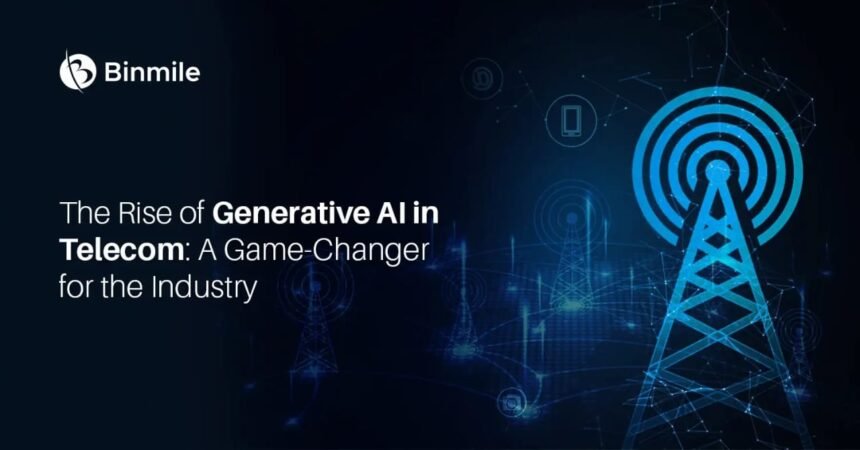Enhancing user experience is crucial. Generative AI (GenAI) in Telecom is emerging as a powerful tool to achieve this goal. This article explores how Generative AI in Telecom is transforming user experiences in the telecom sector and the potential future developments in this field.
What is Generative AI?
Generative AI refers to algorithms that can generate new content, such as text, images, and even music, based on the data they have been trained on. Unlike traditional AI, which follows predefined rules, GenAI learns patterns and creates new data that resembles the original dataset.
The Importance of User Experience in Telecom
User experience (UX) in telecom is all about ensuring customers have a seamless and satisfying interaction with services. A positive UX can lead to higher customer retention, increased loyalty, and a better brand reputation.
How Generative AI is Transforming User Experience in Telecom
1. Personalized Customer Interactions
GenAI enables telecom companies to personalize customer interactions by analyzing vast amounts of data to understand individual preferences and behaviors. This allows for tailored recommendations and services that meet specific user needs.
2. Enhanced Customer Support
By integrating GenAI into customer support systems, telecom companies can offer instant, accurate responses to customer inquiries. AI-powered chatbots and virtual assistants can handle routine queries, allowing human agents to focus on more complex issues.
3. Predictive Maintenance and Reduced Downtime
GenAI can predict potential equipment failures by analyzing usage patterns and performance data. This allows telecom companies to perform maintenance proactively, reducing downtime and ensuring a more reliable service for users.
4. Optimized Network Management
Generative AI helps in optimizing network performance by predicting congestion and rerouting traffic accordingly. This ensures that users experience minimal disruptions, even during peak usage times.
5. Innovative Marketing Strategies
Telecom companies can leverage GenAI to create highly targeted marketing campaigns. By analyzing customer data, AI can identify trends and preferences, allowing for more effective promotional strategies.
Case Studies: Success Stories of GenAI in Telecom
1. Verizon’s AI-Powered Customer Service
Verizon has implemented GenAI to enhance its customer service operations. Their AI-powered chatbots handle millions of customer interactions, providing quick and accurate responses, which has significantly improved customer satisfaction rates.
2. AT&T’s Predictive Maintenance System
AT&T uses GenAI to predict and prevent network outages. By analyzing data from their infrastructure, AI can forecast potential failures and schedule maintenance before issues arise, ensuring uninterrupted service for their customers.
3. Vodafone’s Personalized Marketing Campaigns
Vodafone leverages GenAI to analyze customer data and create personalized marketing campaigns. This approach has led to higher engagement rates and increased customer loyalty.
The Future of Generative AI in Telecom
The future of GenAI in telecom looks promising. As technology continues to advance, we can expect even more sophisticated applications of AI to emerge. From fully automated customer service systems to predictive analytics that can anticipate user needs before they arise, the possibilities are endless.
1. AI-Driven Network Management
Future telecom networks will likely be managed almost entirely by AI. This will enable more efficient use of resources and provide users with the best possible experience.
2. Advanced Personalization
As GenAI becomes more advanced, the level of personalization it can offer will increase. This will allow telecom companies to provide even more tailored services, enhancing the overall user experience.
3. Improved Security
AI will play a crucial role in improving the security of telecom networks. By analyzing patterns and detecting anomalies, AI can help prevent cyber attacks and protect user data.
Challenges and Ethical Considerations
While the benefits of GenAI in telecom are significant, there are also challenges and ethical considerations to address. These include data privacy concerns, the potential for job displacement, and ensuring that AI systems are transparent and unbiased.
1. Data Privacy
The use of AI in telecom involves collecting and analyzing vast amounts of data. It is crucial to ensure that this data is handled responsibly and that user privacy is maintained.
2. Job Displacement
As AI systems become more capable, there is a risk of job displacement for human workers. It is important for telecom companies to consider the impact on their workforce and to provide opportunities for reskilling and upskilling.
3. Transparency and Bias
AI systems must be transparent and free from bias. This requires careful design and continuous monitoring to ensure that AI decisions are fair and unbiased.
Conclusion
Generative AI is revolutionizing the telecom industry by enhancing user experience in numerous ways. From personalized interactions and improved customer support to predictive maintenance and optimized network management, the benefits are clear. However, it is essential to address the challenges and ethical considerations to ensure that AI is used responsibly. As we move forward, the continued development and integration of GenAI in telecom by AI development company promise to bring even more innovative solutions and improvements.
FAQs
1. What is Generative AI?
Generative AI refers to AI systems that can create new content, such as text, images, or music, based on the data they have been trained on.
2. How is Generative AI used in telecom?
Generative AI is used in telecom for personalized customer interactions, enhanced customer support, predictive maintenance, optimized network management, and innovative marketing strategies.
3. What are the benefits of using Generative AI in telecom?
The benefits include improved user experience, reduced downtime, more efficient network management, personalized marketing, and enhanced customer support.
4. What are the challenges of implementing Generative AI in telecom?
Challenges include data privacy concerns, the potential for job displacement, and ensuring transparency and fairness in AI systems.
5. How can telecom companies address the ethical considerations of using AI?
Telecom companies can address ethical considerations by prioritizing data privacy, providing opportunities for reskilling employees, and ensuring that AI systems are transparent and unbiased.
For More Update Visit: https://wistoweekly.com/



